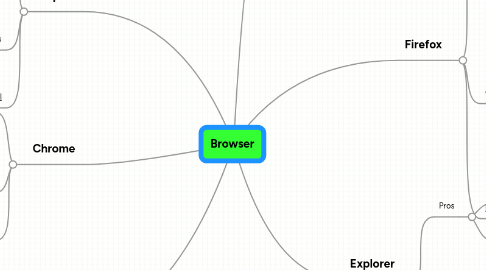
1. Opera
1.1. Pros
1.1.1. Small-Screen Rendering (SSR) technology reformats Web pages to fit the screen of mobile phones, eliminating horizontal scrolling
1.1.2. default features such as: mouse gestures, voice activated browsing (Windows only), mouseless operation, and Opera Show (browser can be launched as a presentation tool). In Firefox, similar features require downloading an extension, or, are not available.
1.2. Cons
1.2.1. VERY strict adherence to CSS/XHTML.This can prove to be very tedious for web designers and developers seeking to validate the same web page against many platforms/browsers.
1.2.2. small market share; as of March only 1.8%; not as widely adopted if you're looking at a product besides IE
1.3. http://www.upenn.edu/computing/eval/2005/webbrowser/procon.html
2. Safari
2.1. Prons
2.1.1. Speed
2.1.2. No borders on edges
2.2. Cons
2.2.1. Dragging bookmarks into new tabs deletes them
2.2.2. Close button is on left side
2.2.3. No setting for showing tabs when only one is open
2.3. http://www.safaribrowserwindows.com/safari-reviews/pros-and-cons-of-the-new-safari-browser/
3. Chrome
3.1. Pros
3.1.1. JavaScript speed is a lightning bolt compared to the other browsers;
3.1.2. Each Tab has its own processor thread, so when a tab crashes, it doesn't take the browser with it;
3.2. Cons
3.2.1. Pop-ups are visible, just at the bottom of the browser tab;
3.2.2. Still in Beta; could be more polished;
3.3. http://wiki.answers.com/Q/What_are_the_pros_and_cons_of_the_Google_Chrome_browser
4. Define: Browser
4.1. A browser is an application program that provides a way to look at and interact with all the information on the World Wide Web.
4.1.1. http://searchwindevelopment.techtarget.com/sDefinition/0,,sid8_gci211708,00.html
5. Explorer
5.1. Pros
5.1.1. largest market share; March 2005 browser statistics list 63.8% for IE 6
5.1.2. only browser that works with Windows Updates (via web)
5.2. Cons
5.2.1. Very little development for standards-compliance and innovation; i.e. CSS / XHTML. Despite repeated statements that Microsoft "supports" standards pages designed to be compliant in Netscape, Firefox, Safari will often break in IE. Does not gracefully degrade pages.
5.2.2. no tabbed browsing
5.3. http://www.upenn.edu/computing/eval/2005/webbrowser/procon.html
6. Firefox
6.1. Pros
6.1.1. Speed. Firefox® is reported to be the fastest browser when it comes to download speed. Not only do programs and files download faster, but you get a record of all your downloads in the form of a table, so you can erase or move them at your convenience.
6.1.2. Security. Firefox® has some advanced security measures that protect your computer from spyware and even certain viruses. Firefox® also comes with a state-of-the-art popup blocker that stops almost 100 percent of popups.
6.2. Cons
6.2.1. ompatibility issues. The main disadvantage of Firefox® is compatibility. Some websites do not show properly in Firefox®, and require you to view them with IE. This includes pages with ActiveX and VBScript, both of which are not supported by Firefox®.
6.2.2. Memory. Firefox® takes a lot of memory to run. Even with an up-to-date computer, you may find that it becomes hard to run Firefox along with a couple of programs. Firefox® also tends to freeze and close when too many tabs are open simultaneously, which is why Firefox® invested heavily in creating the recovery memory feature.
6.2.3. Interrupted service. Another disadvantage of Firefox® is that downloads cannot be resumed if interrupted. This may not be a big deal if you have DSL service, but those on a dial-up connection may have a lot of trouble with this. Firefox® was actually designed for people using high-speed Internet, which means dial-up users can run into many problems along the way.
